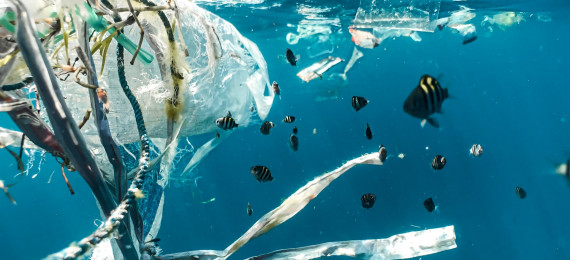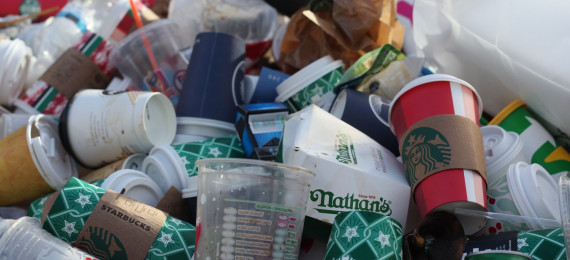Search Lesson Plans
Slammin’ Slogans
This hands-on lesson teaches students about textile recycling in Nova Scotia. Learners create a slogan to encourage textile recycling, which is then placed on T-shirts and displayed within the school.
Recycling Rock Stars
In this interactive lesson, students will get creative by rewriting the lyrics to a popular song to promote recycling. Students will learn how recycling is connected to sustainable development.
Sorting Skits
In this engaging lesson, students use theatre and role playing to teach classmates about recycling. Learners work in groups to create skits that demonstrate the importance of sorting waste.
Make Your Own Paper
Students will learn about the sustainability of Canadian forests and compare forestry practices in Canada and Brazil. They will establish a link between sustainability and recycling through a hands-on activity—making their own recycled paper.
Guess How Long that Garbage Lasts
Learners will investigate how long various waste items take to decompose. They will learn about chemical changes that take place in landfills from solid waste to the production of methane gas. Through group discussion and creative assignments, students will examine the environmental impacts of landfills.
Waste Management: Past and Present
Students will learn how attitudes and behaviours around waste have changed during recent generations, and learn about the traditional Mi’kmaw view that all resources are to be respected, and not wasted. The class will invite an older member of the community for an interview, and will reflect on their own recycling habits.
The Sorting Story
During this interactive lesson, the teacher will share a sorting story and students will listen for important cues. Students will draw a mural to illustrate the story’s concepts.
How are Plankton, Plastic and Polar Fleece Connected?
Learners will investigate how plastic is formed and how recycling helps create a clean environment. Learners will create a commercial to demonstrate their new understanding of the process from plankton to plastic to polar fleece.
Food Waste: The Journey from Mother Earth to Table
In this engaging and thought-provoking activity, students will learn about the journey food goes through before it gets to us, and why it is important to appreciate our food.
Do the Sorting Shuffle
In this lesson, learners become familiar with the different categories of waste through an interactive sorting activity. The lesson includes a discussion about how to better incorporate the 3Rs into everyday life.
Cell Phone Waste and Chimpanzees
Through engaging activities, students will learn about planned and perceived obsolescence. Students will also learn about the types of metals/compounds that are found in cell phones, and the impact that metal mining has on chimpanzee habitat in the Congo Basin.
Can a Plastic Bag Live Forever?
Students learn about the life cycle of a plastic bag and create a timeline comparing historic events with a plastic bag’s lifespan. After learning how long bags last when not recycled or reused, students explore creative ways to reuse plastic bags.
Egg Carton Garden
In this hands-on lesson, students will plant a seed in an egg carton containing a soil/compost mixture, and then watch it sprout! Students will learn about the science of composting, as well as the importance of composting at home and at school. Connections to Mi’kmaw practices of using plants for medicine are available. Note: This activity takes 2–3 weeks to have seeds transform into sprouts/small plants. TRY SIMILAR ACTIVITIES: See Compost Creators lesson plan as an option to create your own compost.
Compost Creators
This lesson goes beyond the classroom and into the schoolyard, as students will build a fully-functional compost pile. This hands-on lesson teaches students about the properties of soil and how composting is important to the environment. It also aligns with Netukulimk (pronounced: ne·du·gu·limk)—the Mi’kmaw concept of respecting the natural world around us and not taking more than we need.
Jellyfish vs. Plastic Bag
Students will learn about the epidemic of plastic waste in the oceans, and its impact on wildlife. After learning how sea turtles often mistake plastic bags for jellyfish, students will brainstorm ways to keep our oceans clean by reducing and recycling plastics. Students consider the Mi’kmaw concept of msit no’kmaq [pronouced, em-set no-gma]—we are all related.


